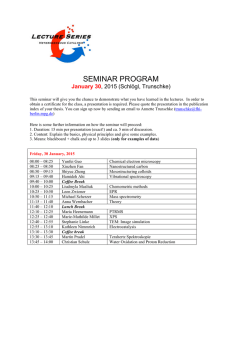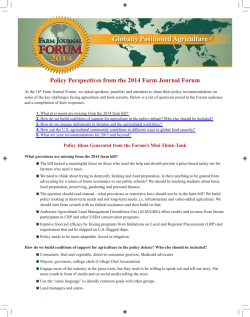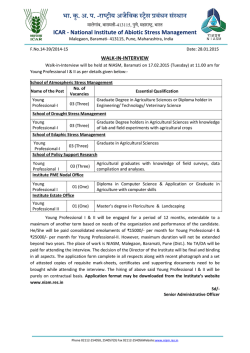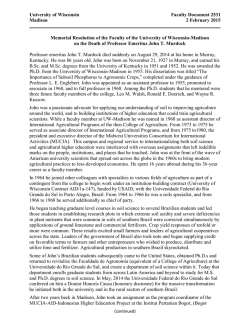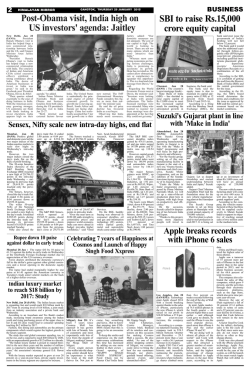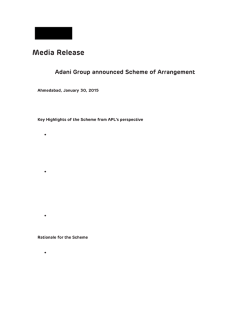
National Sem National Seminar Seminar
National Seminar (February 5-6, 2015) on Magnitude of Extension Approaches in Agricultural Development Jointly Organised by Society of Extension Education, Gujarat & Navsari Agricultural University Navsari Venue Central Examination Hall NAU, Navsari: 396450 (Guj.) Organizing Secretary Dr. R. D. Pandya Professor & Head Society of Extension Education Gujarat Department of Extension Education & Navsari: 396 450 (Guj.) N. M. College of Agriculture, NAU, Phone:02637 282771-75(1205) Navsari Agricultural University, Fax: 02637 282766 Navsari, Gujarat Mobile: +919427862188 e mail: [email protected] National Seminar on (5th & 6th February, 2015) Magnitude of Extension Approaches in Agricultural Development Dear Sir /Madam, It is our great pleasure to inform you that the Society of Extension Education, Gujarat (SEEG) is celebrating the year 2014-15 as the Silver Jubilee year and on that occasion a National Seminar on ‘Magnitude of Extension Approaches in Agricultural Development’ is jointly organised with Navsari Agricultural University, Navsari during 5-6 February, 2015. Considering your vast experience in the field you are cordially invited to participate in the seminar with conceptual article and scientific research paper. The organizing committee has decided to bring out compendium of lead papers & abstracts which will be released during inaugural session of the seminar and circulated to all the delegates. You are requested to print/photocopy the brochure and circulate among the professional colleagues, extension personnel, postgraduate students and other interested faculties and encourage them to ensure live participation with the theme oriented research paper. We look forward to your gracious presence and scholarly deliberation in the seminar. You may contact the Organizing Secretary for any query and further detailed information. With kind regards, Dr. R D Pandya Organizing Secretary Dr. P P Patel President, SEEG BACKGROUND Indian agriculture has established spectacular mile stone through multifarious and strategic approaches, dissemination of agricultural technologies, support through the network of agricultural institutions and policy interventions. By all norms, these approaches paid rich dividend to the agricultural sector in terms of enhancement in quantity and quality of agricultural products. Today, Indian agriculture is vibrant, buoyant and resilient due to radical changes brought through a number of mission and client oriented specific programmes. The series of reforms which later on assumed the status of revolution like Green, White, Yellow, Blue, and Rainbow. The present scenario forced to set an Ever Green Revolution with sustained growth to counter the emerging national and global challenges. Agricultural technology, both generation and transfer, proved to be potential for countering the agriculture problems of India. The Indian extension system is one which gives utmost importance to pragmatic approaches. Based on the lessons learnt from our past extension strategies and in view of the emerging changes, the extension approaches will have to be modernized. The sector to meet the broader challenges such as sustainability, natural resource management, food and nutritional security, conservation of bio-diversity and global competition for maintaining the self reliance achieved in the decades passed. As per the report of National Agricultural Policy of Govt. of India, the rapid growth in IT and the extended goal of extension services for marketing, credit, cold-chains, entrepreneurship and so on, requires to reshuffle the agricultural extension service system including the approaches for transfer of technology. The Division of Extension, Ministry of Agriculture, New Delhi formulated a draft of policy framework for agricultural extension reforms which states the issues like policy reforms, strengthening of research-extension linkages, capacity building, empowering the farmers, main streaming of farm women, use of media & IT and financial sustainability. Further, it signifies that a process leading to sustainable improvement in the quality life of rural people, especially the poor is, mainly prop upped by the approaches. Therefore, this insisted to organize this National Seminar with the themes stated. THEMES OF THE SEMINAR 1. General extension approach This approach assumes that the technology & knowledge are available for local people but not being used by them. As a result, the government involves the NGOs & voluntary organizations. Success is measured in the adoption rate of recommendations which increase the socio-economic condition of farmers. 2. Commodity specialized approach The key characteristic of this approach is to function for increased production through extension, research, input supply, marketing intelligence and prices under single command. Extension is fairly centralized and is oriented towards one commodity or crop and the agent has many functions. 3. ToT approach This is fairly centralized approach and based on a rigorously planning where the technology / recommendation are transferred through different extension teaching methods to farmers, training to agents and subject matter specialists. Close links are maintained between research and extension. Agents are only involved in technology transfer. Success is related to increases in the production of particular crops or commodities. 4. Participatory approach This approach often focuses on the expressed needs of farmers' groups with the goal to increase production and uplifted rural life. Implementation is often decentralized and flexible. Success is measured by the number of farmers actively participating and the sustainability of local extension organizations. 5. ICT approach This approach focuses on subjective communication, distance education, rendering agriculture information, inputs and services through cyber linkages. 6. Project approach This approach ponders the efforts on a particular location, for a specific time period, often with scared resources. Part of its purpose is often to demonstrate the techniques and methods that could be extended and sustained after the project period. Short term changes are often a measure of success. 7. Farming systems approach Systems or holistic approach at the local level is the distinguished characteristic of this type of approach. Close ties with research are required and technology for local needs is developed through an iterative process involving local people. Success is measured by the extent to which local people adopt and continue to use technologies developed. 8. Cost-sharing approach This approach assumes that the cost-sharing with farmers will promote the activities that is more likely to meet local needs and where extension agents are more accountable to local interests. Their role is to give advice and service to facilitate farmers' development. Success is measured by the willingness to pay. 9. Institutional approach This approach uses educational institutions which have technical knowledge and researches to support extension services for rural people. Implementation & planning are often governed by the determinants of formal education. The emphasis is often on the transfer of technical knowledge. 10. Market led extension approach The approach focuses of the extension functionaries need to be extended after harvesting. The regime is to reach the farmer on end to end basis, beginning from package of practices for production to selling of produce at the consumers’ door so, farmers can get remunerative prices of their produces. 11. ITK approach This approach focuses on the indigenous knowledge developed by the farmers through their ingenuity, which are viable and sustainable for the solution of many agricultural and allied problems faced by them without neglecting the nature and culture. 12. HRD/HRM approach This approach focuses on development and management aspects of available human resources of organization and in the field. The major elements are extension machinery and farmers. The end product is known as capacity building which results in work efficiency of an individual. CALL FOR PAPER Participants are encouraged to prepare their papers in relation to the above themes. The participants may present conceptual, review or data based research papers. Narrations of experiences in the form of case studies are also welcome. The abstract should not exceed more than 300 words and be submitted in MS word with two hard copies. It should reach to the Organizing Secretary of the seminar on or before………... Last date for abstract: ........................................... 1 Dec., ‘14 Last date for full length paper: ............................ 15 Dec., ‘14 An online facility for registration, submitting abstract and full length paper is available for the participants. REGISTRATION FEES Members of SEES Non-members Students /Research scholars Foreign delegates Rs.2000/Rs.3000/Rs.1000/$. 100/- This Registration fee should be sent through D. Draft drawn in favour of ‘Organising Secretary, National Seminar SEEG-2015’ payable at Navsari. On the confirmation /acceptance of paper in of National Seminar, the first author will be informed to send Rs. 300/- (for member) and Rs. 600/- (non-member) by Demand Draft in favour of ‘Organising Secretary, National Seminar SEEG-2015’ payable at Navsari to meet the cost of publication of the abstract in souvenir. AWARDS Three awards will be bestowed to following categories...... Award to Young Extension Scientist Best conceptual/research paper Best research paper presentation On every annual meet-cum-seminar, the Society of Extension Education, Gujarat is honouring with an award of ‘Khushalbhai Revabhai Patel Medal /Cash Prize’ to one Bachelor of Agriculture who secured highest grade point in Extension Education out of the four Agricultural Universities of Gujarat. THE SOCIETY OF EXTENSION EDUCATION, GUJARAT Society of Extension Education, Gujarat was established in 1990 with a mission to strengthen the fraternity of extension education. The year 2014-15 is being celebrated as the Silver Jubilee. The ‘Gujarat Journal of Extension Education’ is the countenance of the society. It is being published yearly base. For strengthening feed-back based environment among the extension personnel, the society organises state, national and international seminars and conferences on contemporary topics. As a result the society has proposed several strategic recommendations along with souvenirs. The information about the society, life members and back volumes are available on our website www.gjoee.org. THE NAVSARI AGRICULTURAL UNIVERSITY, NAVSARI The agricultural education in south Gujarat region started way back in 1965 with the establishment of N. M. College of Agriculture at Navsari. During the year 1965 to 1968, initially the college was affiliated to Gujarat University, Ahmadabad and then up to 1972 with South Gujarat University, Surat. After formation of the Gujarat Agricultural University in June, 1972 as an autonomous body, the N. M. College of Agriculture was sifted under the Navsari campus. The campus took its independent status from the erstwhile GAU and provides a separate status by the Government of Gujarat on May 1st, 2004. Consequently, the colleges became the constituent college of Navsari Agricultural University. Under the jurisdiction of university, there are 3 Colleges of Agriculture, 1 ASPEE College of Horticulture and Forestry, 1 ASPEE Institute of AgriBusiness Management,1 Vanbandhu College of Veterinary Science and Animal Husbandry, 1 College of Agriculture Engineering, and Gujarat Agricultural Biotechnology Institute as being working. Beyond, these the university has 3 Agriculture and 1 Horticulture Polytechnique. Information, technologies and techniques evolved by university are being regularly transferred by organising different extension activities through extension centers, research stations and colleges. Sardar Smruti Kendra and Educational Educatorium are the unique identity of university. Research is mandatory activity and university organising researches on major crops of the region through 16 location specific research stations. On the occasion of Golden Jubilee celebration of N. M. College of Agriculture, Navsari and Silver Jubilee of Society of Extension Education, Gujarat the fraternity has decided to organise a National Seminar during 5-6 February, 2015. Navsari is equidistant district town place, connected by road, rail and air (through Surat & Vadodara) from Ahmadabad and Mumbai. It is birth place of Jamsedji Tata & known for Dandi Salt Satyagraha lead by Mahatma Gandhi. The place is known for agriculture commodity trading especially paddy, sugarcane, banana, mango, sapota and vegetables. Winter is pleasant with temperature ranging from 20 0C to 250C. VENUE Central Examination Hall Navsari Agricultural University (NAU), Navsari: 396450 PARTICIPANTS Member of SEEG, MSEE, IEF and ISEE are expected to participate in large number. Besides, a wider participation of Government and NGOs delegates is envisaged. This comprises extension workers from department of Agriculture and voluntary agencies, farm scientists, social scientists, IT specialist, agricultural planners and progressive farmers and farm women. SEMINAR ADVISORY COMMITTEE 1. Dr A R Pathak, Hon. Vice Chancellor, NAU, Navsari 2. Dr G R Patel, Director, Extension Education 3. Dr M K Arvadia, Dean, Agricultural Faculty 4. Dr P P Patel, President, SEE Gujarat 5. Dr J K Patel, Secretary, SEE Gujarat 6. Dr R D Pandya, Organizing Secretary and HoD, Extension Education, NAU, Navsari ACCOMMODATION Registered participants and delegates would be accommodated in various Guest Houses of NAU, Navsari on first come first serve basis. The cost of lodging has to be met by the participants themselves. Breakfast, lunch and dinner will be arranged by the organising committee for the participants and delegates. Contact person is.... Dr. G B Kalaria, Training Associate (T&V) Directorate of Ext. Edu., NAU e mail: [email protected] Mobile: +91 99253 46796 CORRESPONDENCE Dr R D Pandya Organizing Secretary & Professor & Head Department of Extension Education N. M. College of Agriculture, NAU, Navsari: 396 450 (Guj.) Phone: 02637 282771-75(1205) Fax: 02637 282766 Mobile: +919427862188 e mail: [email protected] National Seminar (February 5-6, 2015) on Magnitude of Extension Approaches in Agricultural Development VENUE Central Examination Hall Navsari Agricultural University (NAU), Navsari: 396450 (An online facility for registration, submitting abstract and full length paper is available for the participants.) Registration Form 1. Name: …………………….............................................................................. ………. 2. Designation: ………............................................................................... …………….. 3. Institution / Organisation: ............................................................................................…...……..... ................................................................................................................. 4. e mail: ………………............................................................................... …………… 5. Registration fees: Draft no.: ………....................................................……Dt.: …..............................…. 6. Abstract enclosed: Yes / No Title of the paper (s): a)……………….…………….………………………...……. …………………………………………………………………………........................... b)……………….…………….………………………...……. …………………………………………………………………………........................... 7. Accommodation requires: Yes / No. If yes, No. of person: ...................................... 8. Mode of journey: Bus / Train / Air 9. Arrival Date: ….....…………………. Date: Signature (NB: Participants/Delegates can take photocopy of the form for registration)
© Copyright 2026
